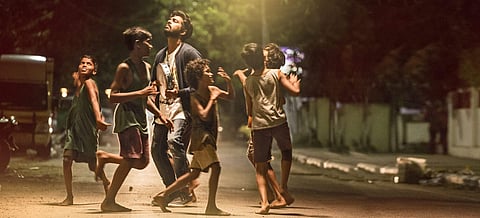Sarvam Thaala Mayam Review: An underdog fights the system in this unconvincing ode to music
Rating:(2.5 / 5)
Fact fuses into fiction in Sarvam Thaala Mayam, which marks Rajiv Menon’s return to direction after 19 years. There’s much that’s real here, with the director himself admitting in interviews that anecdotes from his documentary about celebrated mridangist, Umayapuram Sivaraman, inspired this film. Some familiarity with that documentary helps lift the veil off what’s true and what’s not. The Christian mridangam maker and his son, who aspires to play at Carnatic Academy (Music Academy, obviously), is straight from Sivaraman’s life. Vembu Iyer (Nedumudi Venu, who plays the role with a lot of strength, and occasionally, vulnerability) is, I suppose, moulded after Sivaraman. How much, is anybody’s guess. Vembu’s refusal to shake hands, fearing damage to his fingers, is again Sivaraman. The bit about not performing with female singers is again him. It’s perhaps on account of the reality of it all that the film has been conceived to look like a documentary? This film is quite some distance away from the visually rewarding experiences the director has conjured up over the years as a cinematographer.
The question is, where does the documentary end, and where does the feature film begin? How much of it is hard-hitting truth, and how much of it is fiction meant to take this truth to a wider audience? It’s an uneasy marriage which Sarvam Thaala Mayam struggles to make sense of throughout. The Vijay adulation and the rabid fan culture of which violence is a part too, seem to operate from the surface. If they hadn’t seemed like crafty additions meant to cater to a group, I would have quite liked the suggestion that this worship for a star is for lack of passion for something else. In Peter’s case, you can see him stepping away from all the Vijay love, as his mridangam love blossoms. The seeds for this are sown during a Vembu Iyer concert — but GV Prakash oversells the awe.
Director: Rajiv Menon
Cast: GV Prakash, Nedumudi Venu, Vineeth
A larger concern is the seeming deification of the powerful personality at the heart of this story: Vembu Iyer, who Nedumudi Venu plays with much conviction. This is an alpha male, a man who’s quite hard to like, his mridangam genius notwithstanding. He’s casteist, even if not to the degree of his assistant, Mani (Vineeth, who I rather liked in the role). Vembu doesn’t believe Peter can ‘follow the rules’. When he gives him sacred ash first, and later, rudraksha, you can see that he won’t come in contact with Peter. This isn’t just about his reluctance to shake hands; this is something more sinister. When Vembu steps into the mridangam maker’s hallowed workshop, you can see he can’t even be bothered to remove his footwear — or ask if he must. He thinks himself superior, and not just in terms of his musical ability. This is never as problematised in the film as it should have been, as it seems overawed by his persona — much like Peter himself is. Some anger and hurt on the part of this oppressed Dalit Christian — not limited to music — wouldn’t have been out of place at all.
Perhaps in view of a bigger evil — the obvious casteism practised by Mani — the film felt that it was all right to absolve Vembu of his? Does genius absolve you from your flaws? Surely, somewhere, it needed to be addressed that beyond the luxury of being able to make music, there are more fundamental issues? When one human can’t see the other as an equal, what does music matter? Also, this isn’t among Rahman’s better work, and the music can’t quite distract you from these issues.
Sarvam Thaala Mayam also feels like time-tested tropes being forced to fit into a formula. A sidestep into alcohol, rousing encouragement from the heroine, a predictable contest… They all feel cursory. The idea of a man’s journey into the world, as he discovers music, sounds grand. But here again, it feels rather cursory, given that this transformative travel occurs over a song and a bit more. In another scene, Peter, momentarily rejected by Vembu, begins drumming on the road, and urchins join him. It reminded me of a similar idea used in a Rajiv Menon film decades ago, when urchins join Prabhudheva and Kajol as they dance to Vennilave Vennilave. Back then though, it didn’t seem convenient.

